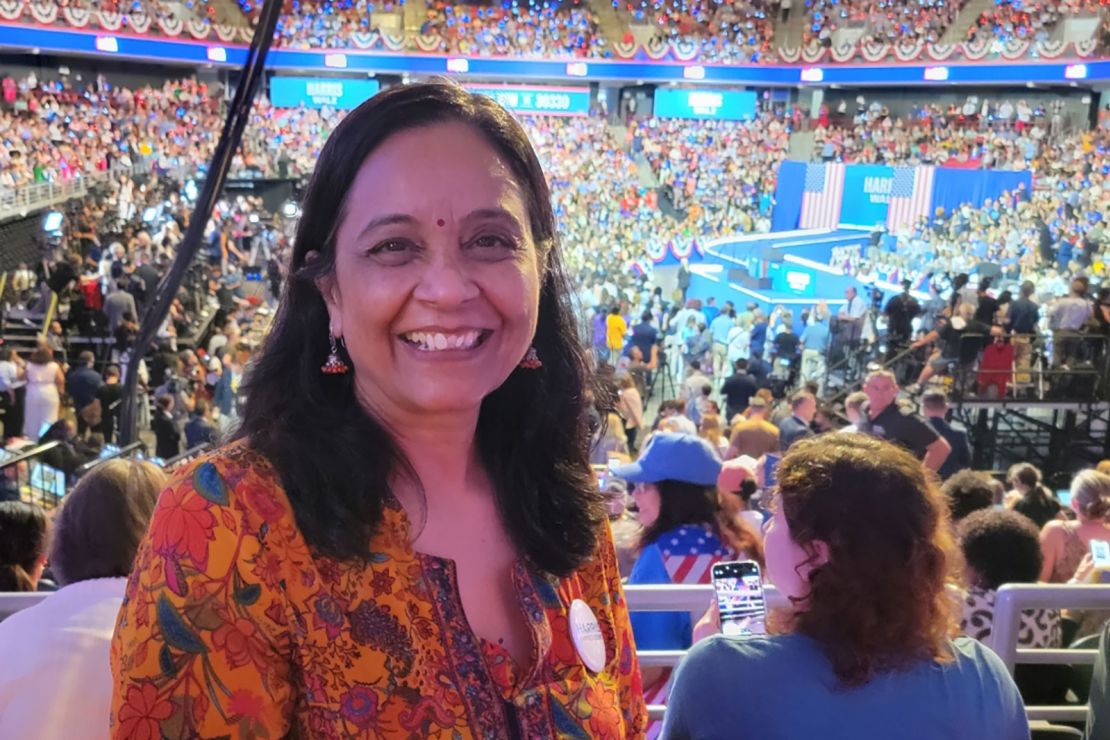On a recent Sunday afternoon, Vineeta Gupta hosted 20 Indian American women at her home in Silver Spring, Maryland. Fueled by chana masala, naan and rice pudding, they wrote hundreds of postcards in an appeal to fellow South Asians.
Their message: Vote Kamala Harris for the next president of the United States.
Organizing for a political candidate was a highly unusual move for Gupta, a 61-year-old physician and human rights lawyer who immigrated to the US from India in 2003. Despite advocating various social justice causes, Gupta — a registered independent — had never involved herself in electoral politics outside of voting.
That changed last month when Harris, the daughter of Indian and Jamaican immigrants, rose to the top of the Democratic ticket after President Joe Biden announced he wouldn’t seek reelection.
Gupta joined several WhatsApp groups of politically activated South Asian Americans. She participated in a “South Asian Women for Harris” Zoom call. She appealed to skeptical women of color on LinkedIn. On August 6, she drove to Philadelphia to watch Harris introduce Minnesota Gov. Tim Walz as her running mate — Gupta’s first election rally.
“It became impossible not to engage,” she told CNN. “The choice is not about Democrats or Republicans. The choice is between democracy and losing it.”

Gupta, who immigrated to the US from India in 2003, says she didn’t engage much with electoral politics until Harris became the presumptive Democratic presidential nominee. She’s seen here at an August 6 Harris rally in Philadelphia. Courtesy Vineeta Gupta
Many Indian Americans appear to share Gupta’s newfound enthusiasm and urgency. Over the past several weeks, national and grassroots political organizers from the community say they’ve seen a groundswell of support and energy for the Harris campaign. Aunties and uncles are exchanging “LOTUS for POTUS” memes in WhatsApp group chats (Kamala means lotus in Sanskrit). The Indian American Impact Fund said the South Asian women Zoom call that Gupta joined raised more than $275,000, and leaders from the advocacy group report an influx of small-dollar donations and volunteer sign-ups.
Indian Americans haven’t historically been a political force in US elections, but the 2024 race could mark a turning point for one of the fastest growing immigrant groups in the country. With the Indian American population more than doubling in key battleground states between 2010 and 2020, some organizers say a fired-up electorate could make a difference come November.
What’s driving the Harris enthusiasm
An estimated 4.8 million people in the US identify as Indian Americans – a relatively small slice of the US electorate – and more than 2.1 million of them are eligible voters, according to the research and policy organization AAPI Data.
Indian Americans tend to be a reliably Democratic voting bloc with high turnout rates: 55% of Indian American voters identified as Democrats or leaned Democratic, and 91% said they plan to vote in November, an AAPI Data survey conducted before Biden’s departure from the race found.
But while nearly half of Indian American voters (46%) indicated in the survey that they would vote for Biden, the figure was down nearly 20 points from 2020 (65%).

